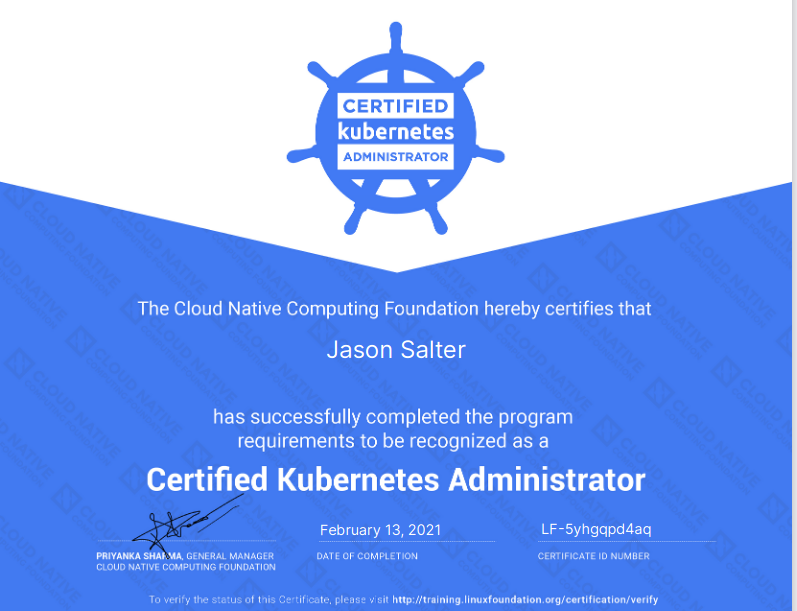
This is a quick overview of my experience in sitting and passing the Certified Kubernetes Administrator exam, the first time I have sat a Linux Foundation certification.
The exam was taken at home, another thing that I have not experienced before which was of concern to me prior to the test. All my previous certifications have always been done at dedicated testing facilities and I really had no real idea of how the testing experience would be at home.
I started getting exam reminders a few days before the exam and these emails had a link to the Linux Foundation portal that would be used to gain access to the test along with relevant background information. This included the system requirements which was basically chrome with a plugin for the screen monitoring and in my case this ran on a laptop running Ubuntu 18.04.
I did the exam from the dining room table and made sure that I had cleared the room and surroundings of any clutter as detailed in the instructions, logging onto the site about 15 minutes before my timeslot. In due course the proctor made contact via a chat window and we spent some time panning the webcam of the laptop over the room and table to ensure everything was clear and there was nothing in the room that would aid my attempt.
It was at this point that I found the wifi signal in the room became intermittent (I'm sure my wifi has a setting to only start playing up on important calls or in this case an important test...). I lost connection a couple of times but found the proctor still present in the chat and after running a CAT5 cable from my laptop directly to the router I was back in business. This took a while to get working but I found the proctor was very patient and once everything was set the exam was opened.
I cannot disclose much about the exam because of the NDA but can say that I found the layout and questions clear. All work is done within the browser which has a terminal window and you are allowed one other tab which can display documentation from Kubernetes.io
The layout meant that the questions were visible while working in the terminal window and the only switching between tabs was when checking documentation. Each question had a clear indication of the context switch that needed to be carried out to ensure you were working on the correct cluster and where necessary it was possible to open up an ssh session to a Host.
I found the exam to be fair and conformed fully to the blueprint, all questions are tasked based and it was clear what was expected. Some tasks were more involved then others and these questions had a higher weighting.
The nature of the test meant that one has to be fairly quick but not at the expense of accuracy. It's very important to take the time to read the question carefully to ensure you carry out exactly what is asked of you. I struggled a little at the beginning of the test with copy and paste but this was probably as much to do with muscle memory of working in a normal terminal session and nerves.
I was able to complete all the questions but didn't get a chance to double check some of the answers and I know there was at least one task that I knew I didn't complete (sometimes you just have to cut your losses and a combination of the clock ticking and timely warnings of time meant I ended up skipping to the next questions).
All in all I think the experience was quite positive and a fairer test then some other vendors (I'm looking at you Cisco...). It is a test that is very hands on and I would recommend the only way to study is to build, upgrade, backup and break clusters in as many ways as possible (managed Kubernetes or minikube will only take you so far).